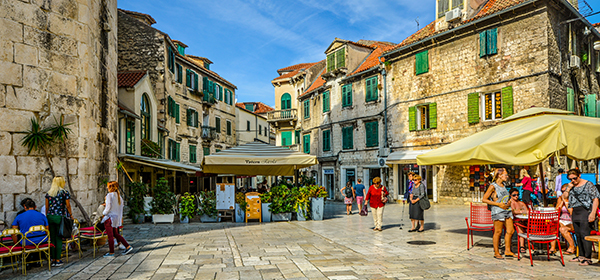
Thinking about moving to Split? Below we highlight some of the pros and cons of living in Split.
Split, the second-largest city in Croatia, is a vibrant coastal metropolis that offers a unique blend of ancient history and modern living. Nestled on the eastern shore of the Adriatic Sea, Split is known for its stunning beaches, historic sites, and a lively food and drink scene. But like any city, living in Split has its pros and cons. This article will delve into the advantages and disadvantages of calling this Croatian city home.
Pros of Living in Split
One of the most significant advantages of living in Split is its rich history and culture. The city is home to the Diocletian’s Palace, a UNESCO World Heritage site that dates back to the 4th century. Walking through the palace’s ancient stone streets, you can’t help but feel a sense of awe at the city’s long and storied past. Split also boasts a number of other historic sites, including the Cathedral of Saint Domnius and the Ivan Meštrovi? Gallery, which showcases the work of one of Croatia’s most famous sculptors.
Another major pro of living in Split is its stunning natural beauty. The city is surrounded by the azure waters of the Adriatic Sea, and its coastline is dotted with beautiful beaches like Ba?vice Beach and Bene Beach. Just a short drive from the city, you’ll find the breathtaking Krka National Park, where you can hike through lush forests, swim in crystal-clear lakes, and marvel at stunning waterfalls.
Split also offers a high quality of life. The city has a laid-back, Mediterranean lifestyle that many people find appealing. The pace of life is slower here than in many other European cities, and locals place a high value on spending time with family and friends. The city also has a low cost of living compared to many other European destinations. For example, a meal at an inexpensive restaurant in Split costs around 70 HRK (about $11), while a one-bedroom apartment in the city center rents for about 3,000 HRK (around $470) per month.
Finally, Split has a vibrant food and drink scene. The city is known for its fresh seafood, locally grown fruits and vegetables, and delicious Croatian wines. There are numerous restaurants, cafes, and bars where you can sample local delicacies. For instance, Konoba Marjan is a popular restaurant that serves traditional Dalmatian dishes, while Paradox Wine & Cheese Bar offers a wide selection of Croatian wines and cheeses.
Cons of Living in Split, Croatia
While there are many advantages to living in Split, there are also some downsides. One of the main cons is the city’s tourism industry. Split is a popular tourist destination, and during the summer months, the city can become crowded with visitors. This can lead to increased prices, especially in the city center, and can make it difficult to find a quiet spot on the beach or a table at a popular restaurant.
Another downside of living in Split is the language barrier. While many people in the city speak English, especially those working in the tourism industry, not everyone does. This can make everyday tasks like shopping or visiting the doctor more challenging. However, many expats find that learning a few basic phrases in Croatian can go a long way in making life in Split easier.
The job market in Split can also be a challenge. While the tourism industry provides many jobs, these are often seasonal and low-paying. Other industries, like technology and finance, are less developed in Split than in other European cities. However, there are opportunities for expats who are willing to be flexible and creative. For example, many foreigners living in Split work remotely for companies based in other countries, or start their own businesses.
Finally, while Split has a lower cost of living than many other European cities, it’s worth noting that wages in Croatia are also lower. The average monthly net salary in Split is around 6,000 HRK (about $940), which is lower than the European average. This means that while the cost of living may be affordable for expats earning a foreign salary, it can be challenging for locals and those earning a Croatian wage.


